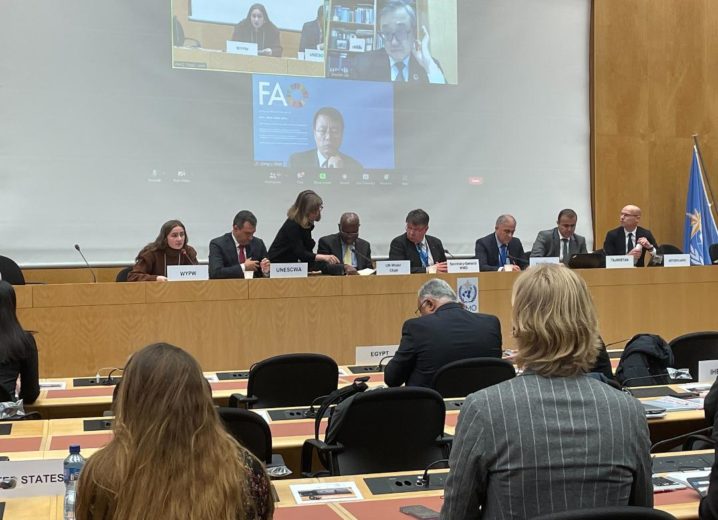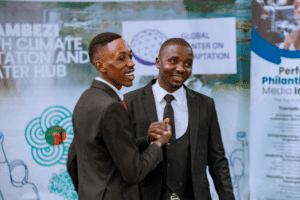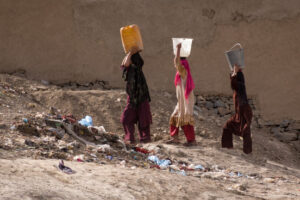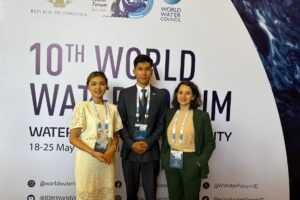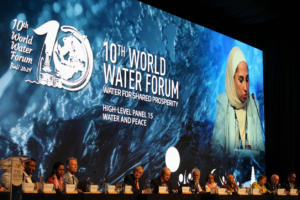Description
The 36th UN-Water Meeting was held in person, in Geneva, Switzerland, and online on April 7th and April 8th, 2022. The meeting offered the 121 registered participants members, partners, and observers, the first opportunity to meet in person, after two years of online UN-Water sessions. During the meeting, participants in Geneva were visibly relieved, eagerly taking the opportunity to advance some important agenda items and catch up and exchange ideas in the corridors.
Central to the discussions during the meeting, were the preparations for the upcoming UN 2023 Water Conference, to be held at UN Headquarters in New York in March 2023. Participants highlighted that this important Conference offers a “once-in-a-generation opportunity” to mobilize actors and generate action and partnerships to achieve internationally agreed goals and targets, including those in Sustainable Development Goal 6 (clean water and sanitation). The ambition of the Conference to make a lasting global impact was clear, as it will conclude with a set of voluntary commitments—a Global Water Pact—and a roadmap for the second half of the International Decade for Action on Water for Sustainable Development, which concludes in 2028, and the Sustainable Development Goals (SDGs), which are set to be achieved by 2030.
The WYPW was the only youth organization present, represented by WYPW president Carolina Tornesi Mackinnon and vice president Danielle Kamtié.
On Thursday, Carolina Tornesi Mackinnon, moderated the Information Session on the UN 2023 Water Conference. The session was attended by UN-Water Members and Partners as well as individuals from Geneva-based missions to the UN.
Around the table, were involved WMO Secretary-General Petteri Taalas, Liu Zhenmin, Under-Secretary-General for Economic and Social Affairs and Secretary-General for the UN 2023 Water Conference, Ziad Khayat, UN Economic and Social Commission for Western Asia, Naiara Costa, DESA, the co-hosts of the upcoming 2022 Dushanbe conference: Sulton Rahimzoda, Special Envoy of the President of Tajikistan to the Water and Climate Coalition Leaders, and Henk Ovink, Special Envoy for International Water Affairs for the Netherlands.
During the meeting, the co-hosts emphasized that the meeting should not “stop” the day after the conference but instead should focus on partnerships that will work beyond the March 2023 event.
The co-hosts said the conference will involve: six plenaries during which the Member States have space to make their statements; five dialogues, the themes for which will be agreed upon later in 2022; three to five special events; side events; and cultural elements such as exhibitions and marathons that will lead to a global focus on water during the week of the meeting. They noted the conference will not result in a negotiated outcome but will deliver: a summary of the conference proceedings; a set of voluntary commitments in the form of a Global Water Pact; and a roadmap toward the second half of the International Decade for Action on Water for Sustainable Development, which will conclude in 2028, and the SDGs, which are set to be achieved by 2030.
On Friday, Danielle Kamtié co-chaired the Panel Discussion: UN 2023 Water Conference with Neil Dhot, from Aquafed. For the first time, Danielle Kamtié drew attention to the WYPW Youth Statement adopted during the 9th World Water Forum, held in Dakar, Senegal, in March 2022. The youth statement called for youth activities to be implemented in all sectors and for youth inclusion to be the norm, rather than the exception. During the second part of the discussion, Neil Dhot invited participants to reflect on the question: is the current international governance structure equipped to deliver on SDG 6? Many participants brought up some suggestions to stop treating water as a “sector,” and instead adopt an approach that treats water as an underpinning theme for all sectors. Some participants expressed optimism, noting that “we are doing our best with what we have,” and “fragmentation” can also be framed more positively, namely as an opportunity for reinforcement of messages across sectors. Participants cautioned against “preaching to the converted,” with one advocating using UN-Water as a platform to achieve a whole-of-society approach and another identifying water as a “mode to build bridges.” One participant suggested integration with the climate adaptation agenda.
Several participants called for better communication and the use of more accessible language that is relevant to all stakeholders, notably youth and local and Indigenous peoples, and that underlines the importance of water as an underpinning theme.
Learn more about the 36th Round table in the summary report.
